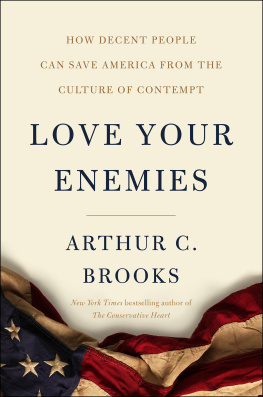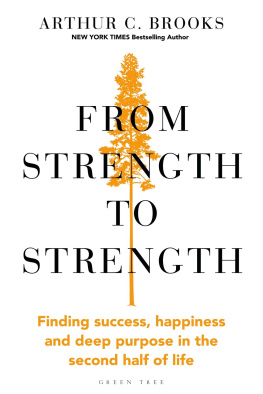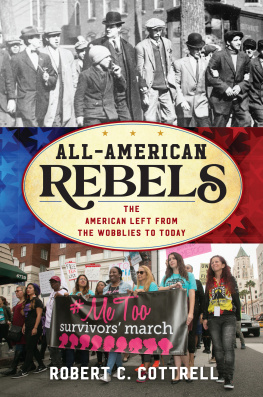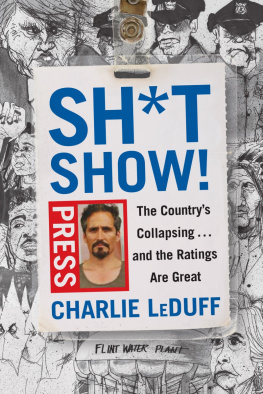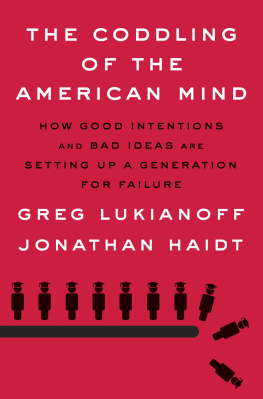Contents
To the memory of Father Arne Panula
We are not enemies, but friends. We must not be enemies. Though passion may have strained, it must not break our bonds of affection. The mystic chords of memory, stretching from every battlefield and patriot grave to every living heart and hearthstone all over this broad land, will yet swell the chorus of the Union when again touched, as surely they will be, by the better angels of our nature.
Abraham Lincoln, First Inaugural Address
Introduction
Are You Sick of Fighting Yet?
I confess without shame, I am tired & sick of war. Its glory is all moonshine.
General William Tecumseh Sherman, 1865
I live and work in Washington, DC, but Im not a politics junkie. To me, politics is like the weather. It changes a lot, people drone on about it constantly, and good is totally subjective. I like winter, you like summer; youre a liberal, Im a conservative. Furthermore, political opinions are like noses: No two are totally alike, but everyone has one. My nose is big, but its existence is utterly unremarkablesort of like my political opinions.
My thing is ideas, especially policy ideas. While politics is like the weather, ideas are like the climate. Climate has a big impact on the weather, but its not the same thing. Similarly, ideas affect politics, but they arent the same.
When done right, policy analysis, like climate science, favors nerds with PhDs. And thats me. I have a PhD in policy analysis; for my doctorate I studied applied microeconomics and mathematical modeling. I taught policy at a university for ten years, before becoming the president of a public policy think tank in Washington, DC, a job Ive held for a decade. (Before graduate school, I spent twelve years making my living as a musician, but not the cool kind. I played the French horn in a symphony orchestra. So yeahnerd-o-rama.)
Having a little distance from politics has made it so that even in the heart of DC, I dont usually take political battles too seriously. In the 2012 presidential election season, my wife and I had a bumper sticker custom-made for the Volvo vegans for romney just to see the reaction of other DC drivers.
However, even a climate scientist has to think about the weather when a hurricane comes ashore, and thats whats happening today. Political differences are ripping our country apart, rendering my big, fancy policy ideas largely superfluous. Political scientists find that our nation is more polarized than it has been at any time since the Civil War. This is especially true among partisan elitesleaders who, instead of bringing us together, depict our differences in unbridgeable, apocalyptic terms.
As much as wed like to, we cant joke the problem away. The only truly funny thing Ive seen in our miserable political culture was a bumper sticker in the run-up to November 2016 that read giant meteor 2016, suggesting that a humanity-ending catastrophe would be better than the elections political choices. As my daughter would say, Thats dark, man.
I remember when I first recognized the force of this hurricane, two and a half years before the 2016 election. I was speaking to a large group of conservative activists in New Hampshire. Public speeches are a big part of what I do for a living, and I address audiences all across the political spectrum. It is the thing I most enjoy about my work. I love meeting people and sharing ideas. It never gets old. This particular audience was an ideological home-field crowd for me, too, because the event was focused on the moral virtues of free enterprise. While Im not a member of either political party, free enterprise is something I deeply believe in.
I was the only nonpolitician on the schedule, and arriving a little early, I listened to a few of the other speakers before I went on. One after another told the audience that they were right and the opposing political side was wrong. By the time I went onstage, the crowd was pretty fired up. My speech was about how people naturally perceive conservatives and liberals in America today. I made the point that liberals are widely considered to be compassionate and empathetic, and that conservatives should work to earn this reputation as well.
After the speech, a woman in the audience came up to me, and she was clearly none too happy with my comments. I thought she was going to criticize my assertion that conservatives are not thought to be as compassionate as liberals. Instead, she told me that I was being too nice to liberals. They are not compassionate and empathetic, she said. They are stupid and evil. She argued that as a public figure, I was obliged to say so plainly because Its the truth.
At that moment, my thoughts went to... Seattle. Thats where I grew up. While my own politics tend more center-right, Seattle is arguably the most politically liberal place in the United States. My father was a college professor; my mother was an artist. Professors and artists in Seattle... what do you think their politics were?
So when that woman in New Hampshire said that liberals are stupid and evil, she wasnt talking about me, but she was talking about my family. Without meaning to, she was effectively presenting me with a choice: my loved ones or my ideology. Either I admit that those with whom I disagree politicallyincluding people I loveare stupid and evil, or I renounce my ideas and my credibility as a public figure. Love or ideology: choose.
Have you been subjected to a similar choice? Have you been told by a newspaper pundit, politician, college professor, or television host that your friends, family, and neighbors on the other side are knaves and fools, implying that if you have any integrity, you must stand up to them or leave them behind? That people with a different perspective hate our country and must be completely destroyed? That if youre not outraged, youre not paying attention? That kindness to your ideological foes is tantamount to weakness?
Whether your politics are on the left, right, or center, most likely you have, and it might just be affecting your life. For example, a January 2017 Reuters/Ipsos poll found that one in six Americans had stopped talking to a family member or close friend because of the 2016 election. A far bigger share of the population has sorted social life along ideological lines over the past few years, by avoiding the places where people disagree with them, curating their news and social media to weed out opposing viewpoints, and seeking out the spacesfrom college campuses to workplaceswhere they find the most ideological compatriots.
We are being driven apart, which is the last thing we need in what is a fragile moment for our country. America isnt in the midst of an economic collapse as we were in 2008, but weve faced major challenges in the past decadeeconomically, socially, and geopolitically. Ten years after the Great Recession, millions feel traumatized by political shifts, cultural change, and the uncertainties of a modern, globalized world.
This is reflected in the deep pessimism felt throughout the country even in the face of economic improvement. In a dramatically strengthening economy, more than four in ten Americans say they think the nations best years are behind us.
We need national healing every bit as much as economic growth. But what are we getting instead from many of our leaders in media, politics, entertainment, and academia? Across the political spectrum, people in positions of power and influence are setting us against one another. They tell us our neighbors who disagree with us politically are ruining our country. That ideological differences arent a matter of differing opinions but reflect moral turpitude. That our side must utterly vanquish the other, even if it leaves our neighbors without a voice.

